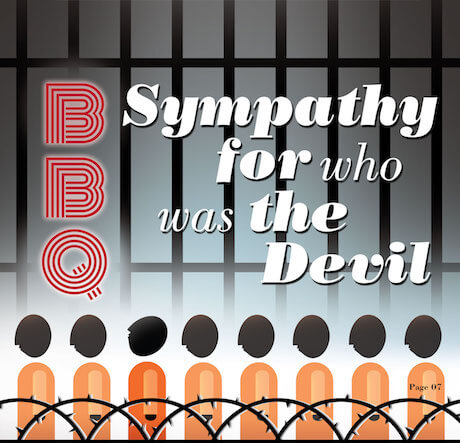A surveillance photo of Bayna-Lekheim El-Amin in Dallas BBQ released by the police. | NYPD DCPI
BY DUNCAN OSBORNE | Bayna-Lekheim El-Amin was sentenced to nine years in prison and three years post-release supervision for assaulting two men in the Dallas BBQ in Chelsea in 2015.
“The jury rejected your claim of self-defense,” said Arlene Goldberg, the judge who heard the case in Manhattan Supreme Court, on September 15. “That you did not cause serious physical injury to them was only a matter of luck.”
El-Amin faced five low-level felony assault charges in a May 5, 2015 altercation he had with Jonathan Snipes, 33, and his then-partner, Ethan York-Adams, 26, in the restaurant, which is located at Eighth Avenue and 23rd Street.
Case initially viewed as anti-gay hate crime now seen widely as one about heavy sentences for men of color
The prosecution’s case, which included several videos, was that the fight was divided into three parts and the 42-year-old was not charged with any crime in part one, where he was defending himself from Snipes, who started the fight by attacking El-Amin.
In parts two and three, El-Amin was continuing to fight when Snipes had effectively surrendered, the prosecution said.
A screen grab from video that circulated immediately after the Dallas BBQ incident last May showing Bayna-Lekheim El-Amin bringing a chair down over Ethan York-Adams’ head. | ISAAM SHAREF VIA YOUTUBE.COM
El-Amin always faced the greatest jeopardy from his actions in part three, where he can be seen hitting the two men on their heads with a heavy wooden chair as they stand with their backs to him.
“The case boils down to this defendant took it too far,” said Leah Saxtein, the prosecutor on the case, during the sentencing. “He decided to get revenge… He used a dangerous instrument to strike them in the most vulnerable part of the human body.”
Saxtein asked that El-Amin be sentenced to 12 years in prison and five years post-release supervision. She noted that El-Amin had a lengthy criminal record of 29 felony convictions in multiple states.
Initially, the case spawned outrage over the attack, which was perceived as a hate crime. El-Amin, who is gay, was not charged with a hate crime.
As the case progressed and it became apparent that Snipes may have told less than the whole story in his early comments to the press, corners of the LGBTQ community began supporting El-Amin.
Some 30 people turned out for the sentencing, with a large number wearing light blue arm or head bands to show support for El-Amin.
On May 27 of this year, Robb Stone, an artist who now lives in Los Angeles, posted a Facebook picture of Snipes and York-Adams with lengthy text that described them “a pair of Privileged assholes.” Within 10 days, the post had 569 shares and 769 likes.
Ultimately, the view became that El-Amin was facing multiple felony charges because Snipes and York-Adams were white and El-Amin was black.
Chicago artist Robb Stone’s Facebook post about the case. | FACEBOOK.COM
“I know that you want to cast this, your supporters as well, as an issue about race,” Goldberg said. “I don’t see it that way… When you picked up that chair that was a criminal act that cannot be excused.”
Neither Snipes nor York-Adams attended the sentencing or are known to have delivered victim impact statements. The couple ended their relationship and York-Adams now lives in Tennessee. Snipes remains living in New York City.
El-Amin’s attorney, Percy Gayanilo, asked Goldberg to impose the minimum sentence –– three-and-a-half years.
“I ask your honor to sentence him to the minimum allowed,” Gayanilo said. “I understand your honor can’t go below that.”
The night of the fight, both Snipes and York-Adams refused medical attention because neither had health insurance. When they later learned that New York pays for healthcare for crime victims, they sought treatment. The evidence at trial was that neither man was seriously injured.
“The injuries sustained by the victims were minimal,” Gayanilo said.
El-Amin also spoke, referring to Snipes and York-Adams as the “drunk white men who felt they were entitled to swing on me.”
At times during the trial and during the sentencing, he has expressed the view that his side has not been heard. He pointed to his more recent community work as evidence that his criminal record does not represent who he is today.
“Yes, I have a past record,” he said. “I own up to that. I paid for everything I’ve done.”






























